- Home
- Paullina Simons
Tatiana and Alexander: A Novel
Tatiana and Alexander: A Novel Read online
Tatiana and Alexander
A Novel
Paullina Simons
Once again for my grandfather and grandmother,
ninety-eight and ninety-four, who still plant cucumbers
and grow flowers and live happily ever after,
and
for our good friend Anatoly Studenkov,
still as ever left behind in Russia, who does not.
And in the moonlight’s pallid glamour
Rides high upon the charging brute
Head held high ’mid echoing clamour
The Bronze Horseman in pursuit.
And all through that long night no matter
What road the frantic wretch might take
There would pound with ponderous clatter
The Bronze Horseman in his wake.
—Aleksandr Pushkin
Contents
Epigraph
Prologue
Book One
The Second America
Chapter One
IN THE DARK EVENING, in a small fishing village that…
Chapter Two
TATIANA STUMBLED OUT OF bed and walked to the window.
Chapter Three
MATTHEW SAYERS APPEARED BY Alexander’s bed at around one in…
Chapter Four
TATIANA TRIED TO READ to improve her English while she…
Chapter Five
THEY CAME FOR HIM a few hours into the night.
Chapter Six
TATIANA WAS SITTING BY the window, holding her two-week-old baby…
Chapter Seven
HE HEARD VOICES OUTSIDE, and the door opened.
Chapter Eight
EDWARD CAME IN TO check on Tatiana in the middle…
Chapter Nine
WHEN ALEXANDER OPENED HIS eyes—did he open them?—it was still…
Chapter Ten
THERE WAS SOMETHING UNDENIABLY comforting about living and working at…
Chapter Eleven
JULY HAD GONE BY, and August, too, and September. Seven…
Chapter Twelve
“MAJOR!”
Chapter Thirteen
FINALLY, ON A SUNDAY in late October, Tatiana agreed to…
Chapter Fourteen
SLONKO WAS DEAD, BUT nothing was resolved about Alexander’s fate.
Chapter Fifteen
ALEXANDER WAS ESCORTED TO the rear of the current front,…
Chapter Sixteen
ALEXANDER CALLED OUSPENSKY INTO his tent. “Lieutenant, what’s wrong with…
Chapter Seventeen
TATIANA AND ANTHONY WERE invited to spend Christmas Eve with…
Chapter Eighteen
THE SOVIET MEN WERE still dying at Sinyavino, and the…
Chapter Nineteen
THE ROOM IS STARK white. The curtains, white, barely move.
Chapter Twenty
LAZAREVO—EVEN THE NAME itself was reminiscent of myth, of legend,…
Chapter Twenty-One
TATIANA COULDN’T LEAVE ALEXANDER’S medal alone. Couldn’t leave Orbeli alone.
Chapter Twenty-Two
THEY HAD STOPPED NEAR the woods in eastern Poland and…
Book Two
The Bridge to Holy Cross
Chapter Twenty-Three
IN LUBLIN, ALEXANDER’S TROOPS rested and liked it so much…
Chapter Twenty-Four
“WHERE ARE WE GOING?” Vikki said. “And why? I don’t…
Chapter Twenty-Five
DEEP IN THE DENSE thick forest of the mountains, a…
Chapter Twenty-Six
EDWARD LUDLOW CAME THROUGH the double doors of the hospital…
Chapter Twenty-Seven
ALEXANDER SLEPT, SITTING UP against the tree with Pasha’s head…
Chapter Twenty-Eight
ON NEW YEAR’S DAY, Tatiana went across the bay with…
Chapter Twenty-Nine
PERHAPS THEY WERE RIGHT in what they said about Colditz.
Chapter Thirty
IN APRIL THE AMERICANS and Russians swarmed over Germany, and…
Chapter Thirty-One
THE AMERICANS LIBERATED COLDITZ in April after three days of…
Chapter Thirty-Two
ON THE LOWER EAST Side, Tatiana, Vikki, and Anthony were…
Chapter Thirty-Three
THE TRAIN WAS STOPPED, once, twice, fifteen times along the…
Chapter Thirty-Four
TATIANA AGREED TO GO to dinner with Edward. Vikki looked…
Chapter Thirty-Five
ALEXANDER DIDN’T KNOW WHAT month it was when the train…
Chapter Thirty-Six
TATIANA WAS PUTTING ANTHONY to bed when he suddenly said,…
Chapter Thirty-Seven
NEW YEAR’S DAY. TATIANA, as usual, went ice skating in…
Chapter Thirty-Eight
“COME ON, LET’S GO out,” Vikki said petulantly. “What are…
Book Three
Alexander
Chapter Thirty-Nine
TATIANA WENT TO GERMANY on faith.
Chapter Forty
MARTIN WANTED TO START the next day. Tatiana said no.
Chapter Forty-One
THE NEXT MORNING THEY woke at six. At seven, housekeeping…
Acknowledgments
About the Author
Praise
Other Books by Paullina Simons
Credits
Copyright
About the Publisher
PROLOGUE
Boston, December 1930
ALEXANDER BARRINGTON STOOD IN front of the mirror and adjusted his red Cub Scout tie. Rather, he was attempting to adjust his Cub Scout tie, because he couldn’t take his eyes off his face, a face uncharacteristically glum. His mouth was turned down. His hands were fidgeting with the gray-and-white tie, unable to do a good job, to day of all days.
Stepping away from the mirror, he looked around the small room and sighed. It wasn’t much, a wood floor, drab brown-branch wallpaper, a bed, a nightstand.
It didn’t matter about the room. It wasn’t his room. It was a rented room, a furnished rented room and all the furniture belonged to the landlady downstairs. His real room was not in Boston but back in Barrington, and he had really liked his old room and hadn’t felt the same way about any other room he had lived in since. And he had lived in six different rooms since two years ago when his father sold their house and took Alexander out of Barrington.
Now they were leaving this room, too. It didn’t matter.
Rather, that’s not what mattered.
Alexander looked in the mirror again. He came up flush to the mirror, stuck his face against the glass and breathed out deeply. “Alexander,” he whispered. “What now?”
His best friend Teddy thought it was the most exciting thing in the world, Alexander’s leaving the country.
Alexander couldn’t have disagreed more.
Through his partly open door, he heard his mother and father arguing. He ignored them. They tended to argue through stress. Presently the door opened and his father, Harold Barrington, came in.
“Son, are you ready? The car is waiting for us downstairs. And your friends are downstairs, too, waiting to say goodbye. Teddy asked me if I would take him instead of you.” Harold smiled. “I told him I just might. What do you think, Alexander? You want to trade places with Teddy? Live with his crazy mother and crazier father?”
“Yes, because my own parents are so sane,” said Alexander. Harold was thin and of medium height. His one distinguishing feature was a resolutely set chin on a broad, square-jawed face. At the age of forty-eight his light-brown, graying hair was still thick upon his head, and his eyes
were intense and blue. Alexander liked it when his father was in a good mood because then the eyes lost some of their seriousness.
Pushing Harold out of the way, his mother, Jane Barrington, strolled in, wearing her best silk dress and white pillbox hat, and said, “Harry, leave the boy alone. You can see he’s trying to get ready. The car will wait. And so will Teddy and Belinda.” She smoothed out her thick, long dark hair arranged under the hat. Jane’s voice still carried traces of the lilting rounded Italian accent that she had not been able to lose since coming to America at seventeen. She lowered her voice. “I never liked that Belinda, you know.”
“I know, Mom,” said Alexander. “That’s why we’re leaving the country, isn’t it?” He watched them in the mirror. He looked most like his mother. In personality he hoped he was more like his father. He didn’t know. His mother amused him, his father confounded him. “I’m ready, Dad,” he said.
Harold came over and put his arm on Alexander’s shoulder. “And you thought Cub Scouts was an adventure.”
Cub Scouts was plenty for me. “Dad?” he asked, looking not at his father but at his own reflection. “If it doesn’t work out…we can come back, right? We can come back to—” He stopped. He didn’t want his father to hear his voice crack. Taking a steadying breath, he finished, “To America?”
When Harold didn’t reply, Jane came up to Alexander, who now stood between his parents, his mother in small heels three inches taller than his father, who was a good foot and a half taller than Alexander. “Tell the boy the truth, Harold. He deserves to know. Tell him. He is old enough.”
Harold said, “No, Alexander. We are not coming back. We are going to make the Soviet Union our permanent home. There is no place for us in America.”
Alexander wanted to say that there had been a place for him. Alexander had a place in America. Teddy and Belinda had been his friends since they were all three. Barrington was a tiny, white-shingled, black-shuttered town with three steepled churches and a short main street that ran four blocks from one end of town to the other. In the woods near Barrington, Alexander had had a happy childhood. But he knew his father didn’t want to hear it, so he said nothing.
“Alexander, your mother and I, we are absolutely sure this is the right thing for our family. For the first time in our lives, we are finally able to do what we believe in. We are no longer paying lip service to the communist ideals. It’s easy to propound change while living in absolute comfort, isn’t it? Well, now we are going to live what we believe. You know it’s what I fought for my whole adult life. You’ve seen me. And your mother, too.”
Alexander nodded. He had seen them. His father and mother arrested for their principles. Visiting his father in jail. Being unwelcome around Barrington. Being laughed at in school. Constantly getting into fights for his father’s principles. He had seen his mother stand by his father’s side, picketing and protesting with him. The three of them had gone to Washington D.C. together to parade communist pride in front of the White House. They were arrested there, too. Alexander had spent a night in a juvenile detention center when he was seven. But on the plus side, he was the only boy in Barrington who had been to the White House.
He had thought all that was sacrifice enough. And then he had thought that breaking with their family and giving up the house that had been the Barrington homestead for eight generations was sacrifice enough. He thought that living in small rented rooms in busy and dusty Boston while disseminating the socialist word was sacrifice enough.
Apparently not.
Frankly, Alexander was surprised by the move to the Soviet Union, and not happily surprised. But his father believed. His father thought the Soviet Union was the place where they would finally belong, where Alexander would not be laughed at, where they would be welcomed and admired instead of shunned and ridiculed. The place where they could build their life up from “meaningless” and make it “meaningful.” Power was to the toiling man in the new Russia, and soon the toiling man would be king. His father’s belief was enough for Alexander.
His mother pressed her painted red mouth on Alexander’s forehead, leaving a bright greasy pucker, which she then rubbed off—not well. “You know, don’t you, darling, that your father wants you to learn the right way, to grow up the right way?”
A little petulantly, Alexander said, “This is really not about me, Mom—”
“No.” Harold’s voice was adamant. His hand never left Alexander’s shoulder. “This is all about you, Alexander. You’re only eleven now, but soon you will become a man. And since you have only one life, you can be only one man. I’m going to the Soviet Union to make you into the man you need to be. You, son, are my only legacy to this world.”
“There are plenty of men in America, too, Dad,” Alexander pointed out. “Herbert Hoover. Woodrow Wilson. Calvin Coolidge.”
“Yes, but not good men. America can produce greedy and selfish men, prideful and vengeful men. That’s not the man I want you to be.”
“Alexander,” said his mother. “We want you to have advantages of character that people in America just don’t have.”
“That’s right,” said Harold. “America makes men soft.”
Alexander stepped back from his parents, never taking his eyes off his solemn reflection. That’s what he had been looking at before they came in. Himself. He was looking at his face and wondering, when I grow up, what kind of a man am I going to be? Saluting his father, he said, “Don’t worry, Dad. I’ll make you proud. I’ll be ungreedy and unselfish, unprideful and unvengeful. I’ll be as hard a man as they come. Let’s go. I’m ready.”
“I don’t want you to be a hard man, Alexander. I want you to be a good man.” Harold paused. “A better man than me.”
As they were walking out, Alexander turned around and caught himself in the mirror one last time. I don’t want to forget this boy, he thought, in case I ever need to come back to him.
Stockholm, May 1943
I am on a stake, thought eighteen-year-old Tatiana, waking up one cold summer morning. I cannot live like this anymore. She got up from the bed, washed, brushed her hair, collected her books and her few clothes, and then left the hotel room as clean as if she had not been in it for over two months. The white curtains blowing a breeze into the room were unrelenting.
Inside herself was unrelenting.
Over the desk there was an oval mirror. Before Tatiana tied up her hair she stared at her face. What stared back at her was a face she no longer recognized. Gone was the round baby shape; a gaunt oval remained over her drawn cheekbones and her high forehead and her squared jaw and her clenched lips. If she had dimples still, they did not show; it had been a long time since her mouth bared teeth or dimples. The scar on her cheek from the piece of the broken windshield had healed and was fading into a thin pink line. The freckles were fading too, but it was the eyes Tatiana recognized least of all. Her once twinkling green eyes set deep into the pale features looked as if they were the only ghastly crystal barriers between strangers and her soul. She couldn’t lift them to anyone. She could not lift them to herself. One look into the green sea, and it was clear what raged on behind the frail façade.
Tatiana brushed her shoulder blade-length platinum hair. She didn’t hate her hair anymore.
How could she, for Alexander had loved it so much.
She would not think of it. She wanted to cut it all off, shear herself like a lamb before the slaughter, she wanted to cut her hair and take the whites out of her eyes and the teeth out of her mouth and tear the arteries out of her throat.
Tying the hair up in a bun on top of her head, Tatiana put a kerchief over it, to attract as little attention as possible, though in Sweden—a country full of blonde girls—it was easy to become lost in the crowd.
Certainly she had become that.
Tatiana knew it was time to go. But she could find nothing inside to propel her forward. She had the baby inside her, but it was as easy to have a baby in Sweden as it was in America. Easie
r. She could stay. She wouldn’t have to make her way across an unfamiliar country, get a passage on a freighter headed for Britain and then travel across the ocean to the United States in the middle of a world war. The Germans were blowing up the northern waters on a daily basis, their torpedoes detonating the Allied submarines and the blockade ships into high flame balls encircled by black smoke, incongruous against the serene seas of Bothnia and the Baltic, of the Arctic and the Atlantic. Staying safe in Stockholm required nothing more of her than what she had been doing.
What had she been doing?
She’d been seeing Alexander everywhere.
Everywhere she walked, everywhere she sat, she would turn her head to the right, and there he would be, tall in his officer’s uniform, rifle slung on his shoulder, looking at her and smiling. She would reach out and touch thin air, touch the white pillow on which she saw his face. She would turn to him and break the bread for him and sit on the bench and watch him making his slow sure way to her, crossing the street for her. She would walk after Swedish men during the day, men whose backs were broad, whose stride was long, she would stare impolitely into the faces of strangers because it was Alexander’s face she saw etched there. And then she would blink, blink again and he would be gone. And she would be gone, too. She would lower her gaze, and walk on.
She raised her eyes to the mirror. Behind her Alexander stood. He brushed the hair away from her neck and bent to her. She couldn’t smell him, nor feel his lips on her. Just her eyes saw him, almost felt his black hair on her neck.

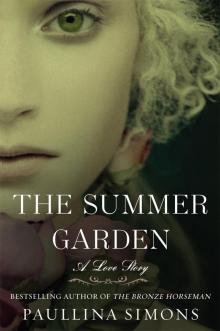 The Summer Garden
The Summer Garden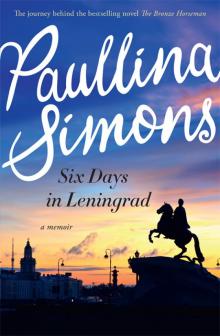 Six Days in Leningrad
Six Days in Leningrad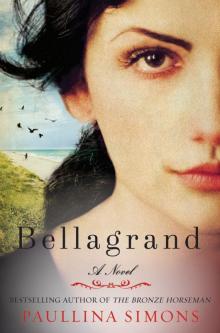 Bellagrand
Bellagrand Tatiana and Alexander
Tatiana and Alexander Road to Paradise
Road to Paradise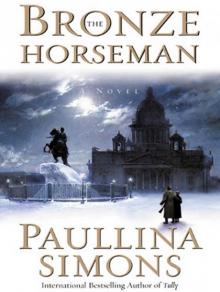 The Bronze Horseman
The Bronze Horseman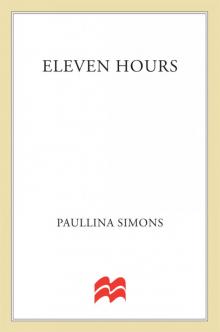 Eleven Hours
Eleven Hours Tatiana's Table: Tatiana and Alexander's Life of Food and Love
Tatiana's Table: Tatiana and Alexander's Life of Food and Love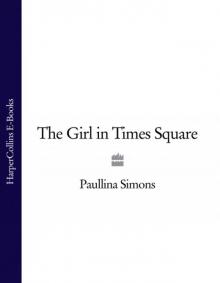 The Girl in Times Square
The Girl in Times Square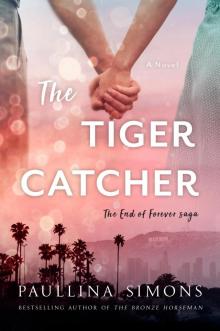 The Tiger Catcher
The Tiger Catcher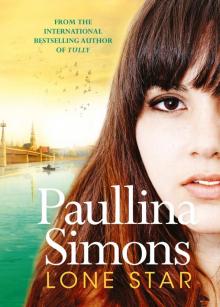 Lone Star
Lone Star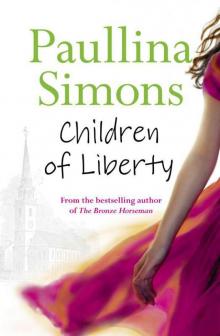 Children of Liberty
Children of Liberty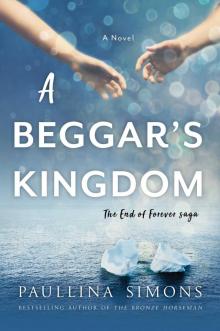 A Beggar's Kingdom
A Beggar's Kingdom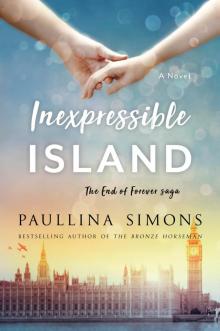 Inexpressible Island
Inexpressible Island Tatiana and Alexander: A Novel
Tatiana and Alexander: A Novel Tatiana's Table
Tatiana's Table A Song in the Daylight (2009)
A Song in the Daylight (2009)